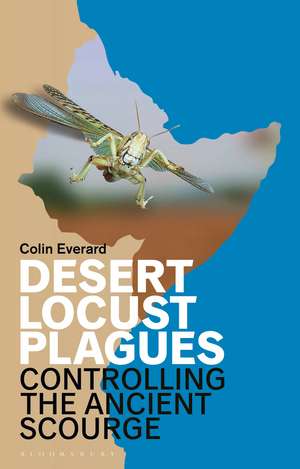Desert Locust Plagues: Controlling the Ancient Scourge
Autor Colin Everard Cuvânt înainte de Prof. Robert A. Chekeen Limba Engleză Paperback – 24 feb 2021
| Toate formatele și edițiile | Preț | Express |
|---|---|---|
| Paperback (1) | 132.64 lei 6-8 săpt. | |
| Bloomsbury Publishing – 24 feb 2021 | 132.64 lei 6-8 săpt. | |
| Hardback (1) | 225.53 lei 3-5 săpt. | |
| Bloomsbury Publishing – 28 noi 2018 | 225.53 lei 3-5 săpt. |
Preț: 132.64 lei
Preț vechi: 172.33 lei
-23% Nou
Puncte Express: 199
Preț estimativ în valută:
25.39€ • 27.59$ • 21.34£
25.39€ • 27.59$ • 21.34£
Carte tipărită la comandă
Livrare economică 21 aprilie-05 mai
Preluare comenzi: 021 569.72.76
Specificații
ISBN-13: 9781350202122
ISBN-10: 1350202126
Pagini: 226
Dimensiuni: 140 x 216 x 16 mm
Greutate: 0.27 kg
Editura: Bloomsbury Publishing
Colecția Bloomsbury Academic
Locul publicării:London, United Kingdom
ISBN-10: 1350202126
Pagini: 226
Dimensiuni: 140 x 216 x 16 mm
Greutate: 0.27 kg
Editura: Bloomsbury Publishing
Colecția Bloomsbury Academic
Locul publicării:London, United Kingdom
Notă biografică
Colin Everard worked with Desert Locust Control in the Horn of Africa, as well as in Kenya, the then Tanganyika (now Tanzania), and in Uganda. As head of operations in the field for Desert Locust Control, he was responsible for the strategic mounting and directing of anti-locust campaigns to combat huge invasions of desert locust swarms during an extended plague period; these campaigns were aimed at protecting the agriculture and livestock grazing of the region. Subsequent to his work with Desert Locust Control, Colin Everard worked in the International Civil Aviation Organization. He lives in Vienna. This is his 4th book.
Cuprins
List of IllustrationsForeword by Robert A. Cheke, (National Resources Institute, University of Greenwich, UK)AcknowledgementsIntroduction 1. An Uninvited Christmas Visitor2. Luk Haiyah3 The Locust Life 4. The Ogaden 5. Stones6. The Tip of the Horn of Africa 7. A Change of Aircraft Epilogue: Controlling the Desert Locust - the Situation In 2018. Progress and ProblemsAfterwordAppendixIndex
Recenzii
It is a very personal account that echoes humanity in a world where being human is sometimes disappearing . [A] must-read for those wishing to learn about the world's most dangerous migratory pest . Desert Locust Plagues is a modest testimony to the silent and mostly unknown efforts by so many people who continue to protect our food security.
Everard's book is both a memoir of an exciting and sometimes hazardous career - every chapter has a close brush with death - and also an account of the development of the technology.
In this lovely little book - part science, part autobiography - Colin Everard tells tales of his time in the Horn of Africa 60 or so years ago ... [and] offers a keen analysis of the scientific developments that have helped the cause - from pesticides that don't do too much environmental harm, to satellite observation ... [His] appreciation of the region's natural beauty is infectious.
One of the great unsung achievements of the 20th century and Everard pays it a fitting tribute.
Everard's passages on locusts are interesting, as are those on the technological developments.
An enthralling account for anyone who remembers how tough and yet supremely fulfilling it could be to brave deserts, mountains, the elements and hostility in order to further a crucial cause. If your patch included any of Somalia, Ethiopia, Eritrea, Djibouti or Kenya it is nigh on compulsory reading.
Everard's book is both a memoir of an exciting and sometimes hazardous career - every chapter has a close brush with death - and also an account of the development of the technology.
In this lovely little book - part science, part autobiography - Colin Everard tells tales of his time in the Horn of Africa 60 or so years ago ... [and] offers a keen analysis of the scientific developments that have helped the cause - from pesticides that don't do too much environmental harm, to satellite observation ... [His] appreciation of the region's natural beauty is infectious.
One of the great unsung achievements of the 20th century and Everard pays it a fitting tribute.
Everard's passages on locusts are interesting, as are those on the technological developments.
An enthralling account for anyone who remembers how tough and yet supremely fulfilling it could be to brave deserts, mountains, the elements and hostility in order to further a crucial cause. If your patch included any of Somalia, Ethiopia, Eritrea, Djibouti or Kenya it is nigh on compulsory reading.
Caracteristici
On-the-ground experience of controlling desert locusts.
